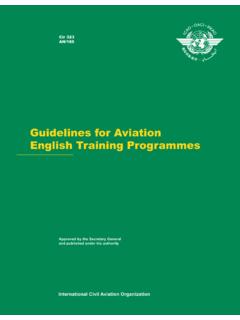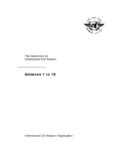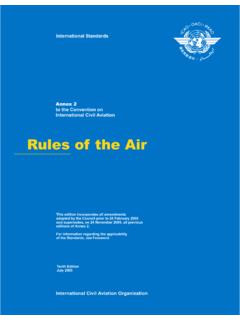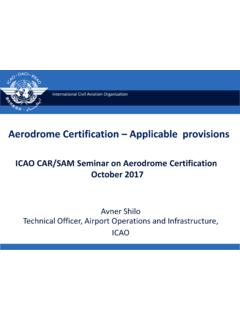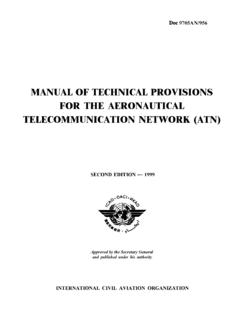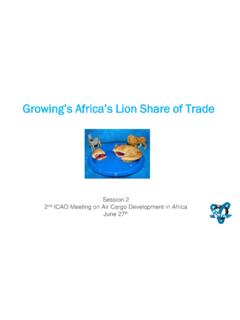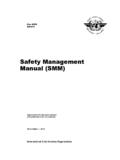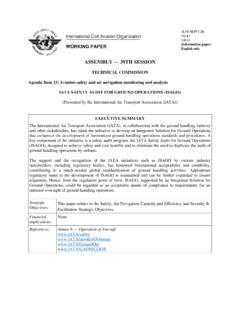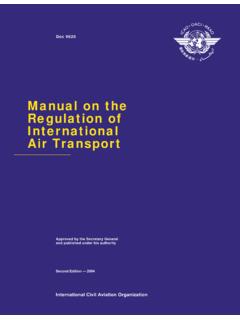Transcription of Global Aviation and Our Sustainable Future
1 International Civil Aviation Organization Briefing for RIO+20 Global Aviation and Our Sustainable FutureINTRODUCTION BY ICAO SECRETARY GENERAL, RAYMOND BENJAMIN ..1 EXECUTIVE SUMMARY: ICAO S KEY MESSAGES FOR RIO+20 ..2 Aviation S ROLE IN THE RIO+20 DISCUSSIONS ..3 ICAO S ACTIVITIES ACROSS THE Sustainable development AGENDA ..6 COLLABORATIVE EFFORTS TOWARDS SUSTAINABILITY ..12 ContentsRIO+20 International Civil Aviation Organization Briefing1 Message from the ICAO Secretary GeneralAir transport has become essential to our Global society. It is a driver of economic, social and cultural development worldwide and has totally changed how we travel, interact with others and do business. It would be difficult to envisage a world without Aviation . Thanks to the democratization of international air travel, the real cost of flying has fallen by 60% over the last 40 years making it more accessible to more people.
2 During the same period, aircraft have become 70% more energy efficient and 75% quieter. Many sectors of our Global economy would be envious of such a track record. But because we estimate that by 2030 the number of domestic and international passengers will reach six billion, travelling on approximately 50 million flights (roughly double the levels of 2011), we know that more must be done. The International Civil Aviation Organization (ICAO), its Member States and industry stakeholders have, for almost 70 years, pooled their collective expertise and wisdom to create a regulatory framework that has stood the test of time. It is for this reason that international civil Aviation is as safe, secure and environmentally sound today as it has ever the 1970s, ICAO s work on environmental protection has emphasized the value of a globally harmonized approach to address the impacts of noise and local air quality around airports, and the much broader challenge of climate change.
3 In addition to its work on technological and operational measures, ICAO is now focusing on four key areas to address Aviation s greenhouse gas emissions: State action plans; Sustainable alternative fuels; Market-based Measures (MBMs); and Global aspirational goals to ensure the long-term sustainability of Aviation . Initiatives deriving from this work will require resources for their implementation. The current proliferation of taxes and proposals to divert funds from the Aviation sector is bound to have an adverse impact on the sector s ability to finance these initiatives and could therefore jeopardize plans for the Sustainable Future for +20 will focus on critical issues such as access to Sustainable energy, Sustainable transport, poverty eradication and Sustainable development goals. The role and impact of international Aviation is central to these issues. The document you hold in your hands outlines ICAO s key messages for decision-makers assembled in Rio.
4 Our strategic partnerships and concrete initiatives are highlighted to demonstrate the significant activity taking place behind the scenes which will lead us to this globally Sustainable Future . It is our responsibility to Future generations. Raymond BenjaminICAO Secretary GeneralCIVIL Aviation HELPED SHAPE OUR Global TARGET IS NOW Sustainable +20 International Civil Aviation Organization Briefing2 RIO+20 International Civil Aviation Organization Briefing2 Executive Summary1. ICAO and its Member States are committed to the development of Global solutions for the Sustainable Future of international civil Aviation , in cooperation with industry, sister united nations agencies and Non-governmental Organizations. While fulfilling its role as a catalyst for economic and social development , air transport is focused on reducing its environmental footprint, under the guidance and leadership of ICAO.
5 2. ICAO expects Rio+20 to strike a balance among the three pillars of sustainability social, economic and environmental. This will allow air transport to grow in an environmentally Sustainable manner, while continuing to ensure freedom to travel by air. 3. The democratization of air travel is one of the wonders of our age. Access to Sustainable air transport must be guaranteed for Future Rio+20 must set clear objectives and establish strong frameworks to address the new energy challenges as we transition to a green economy. Sustainable alternative fuels represent one of the most promising win-win-win solutions for Aviation s Future . Availability of these fuels must be guaranteed through policies that incentivise their development and their Increasing the price of air transport should not be considered as a means to achieve sustainability. The sector is pressing to meet its environmental commitments through its own ICAO calls for better co-ordination of activity at the international level, elimination of duplication in all areas, and to build upon the work of specialized agencies and existing Sustainable development SUMMARY:ICAO s Key Messages for Rio+20 RIO+20 International Civil Aviation Organization Briefing3 Aviation s Role at Rio+20 Sustainable CITIESS ustainable cities cannot thrive without a Sustainable , efficient and integrated transportation system.
6 Such an inter-modal approach stimulates job creation, business development , recreation, cultural activities and services. It also favours a more effective and efficient use of existing transport capacities and facilities, while ensuring connectivity among major urban centres, remote island communities and other destinations served by READINESSThe timely delivery of aid is essential for the humanitarian community to respond to emergencies and to undertake life saving missions. In emergency situations, Aviation s speed and reliability are critical to the timely delivery of food, medicine, organs, support staff, and other necessities to those affected. In these cases, international airports constitute strategic facilities for repatriation and rescue flights, refugee transfers and cargo & POVERTY ERADICATIONThe air transport sector directly employs million people and supports many tens of millions more through indirect and induced employment.
7 It is an integral part of the world s largest industry, travel and tourism, and the sector also offers significant education and specialized training opportunities for young people. Empowerment of women is another success story, where the number of female pilots has risen to 4,000 worldwide. Also, scaling-up existing Sustainable transportation technologies can open the door to high-level jobs and drive long-term, sustained economic S ROLE IN THE RIO+20 DISCUSSIONSThe Aviation sector plays a vital role in many of the Rio+20 critical issues, including Sustainable cities, disaster readiness, jobs, poverty eradication, finance and energy. In all of these areas, ICAO s contribution to international governance aiding in the development of a green economy is +20 International Civil Aviation Organization Briefing4 Aviation s Role at Rio+20 ENERGYA viation is totally dependent on liquid fuels, in contrast with ground transportation where a range of alternative energy sources is available.
8 For safety and technical considerations, the use of renewable wind and solar power, or even hydrogen, is not an option for the foreseeable Future . Aviation , however, is increasingly turning to Sustainable alternative fuels to achieve environmentally sound mobility from renewable energy. Certified drop-in alternative fuels where a biofuel can be blended with traditional jet fuel without having to bring changes to aircraft design or airport fuelling systems are now a reality. Airlines already use biofuels to power regular, commercial flights. As we overcome the technical barriers, the impetus must shift to facilitating the necessary political and financial support to ensure sufficient availability of such fuels, at a competitive price and in a timely myths continue to skew discussions on international Aviation finance:a) Aviation is for the ) Aviation is not ) Aviation is a profitable industry.
9 The reality is that through market deregulation, air fares have consistently declined over time, while living standards and wages have increased overall, to the point where consistently more people have access to air travel. Moreover, contrary to public perception, the international Aviation sector is substantially taxed by States. For example, taxes, fees, charges and surcharges on many international routes are greater than the ticket price. Finally, the net profit margin of Global scheduled airlines was in 2011, and is forecast to be in overshadow the formidable contributions of air travel to everyday life. One case in point: 30 years ago, many Brazilians migrated from rural areas to urban centers. These journeys took days on uncomfortable buses and cost the equivalent of a week s salary. Today, when these migrants return home, they can use air transport in just a few hours and for the equivalent of a day s salary.
10 This improvement in their everyday lives is a tangible success story which the Aviation sector empowered. In order for the international Aviation sector to meet its ambitious CO2 emissions goals and respond effectively to the climate change challenge, the funds required to meet those targets must remain within the sector. Suggestions have been made to place international Aviation in the category of alternative sources of climate finance. This is ill advised because it would result in a financial burden disproportionate to the sector s contribution to Global CO2 emissions, a levy of up to four times the forecast net profit of the airline industry in 2012. Such a policy would limit the ability of the sector to address its own emissions and could adversely impact demand for air travel, thereby reducing the economic benefits that international Aviation delivers, ultimately a lose-lose +20 International Civil Aviation Organization Briefing5 Aviation s Role at Rio+20 INTERNATIONAL GOVERNANCEP rogress on international issues may be improved through enhanced coordination within the UN system itself, recognizing and building upon the mandate and available expertise of each of its agencies.
